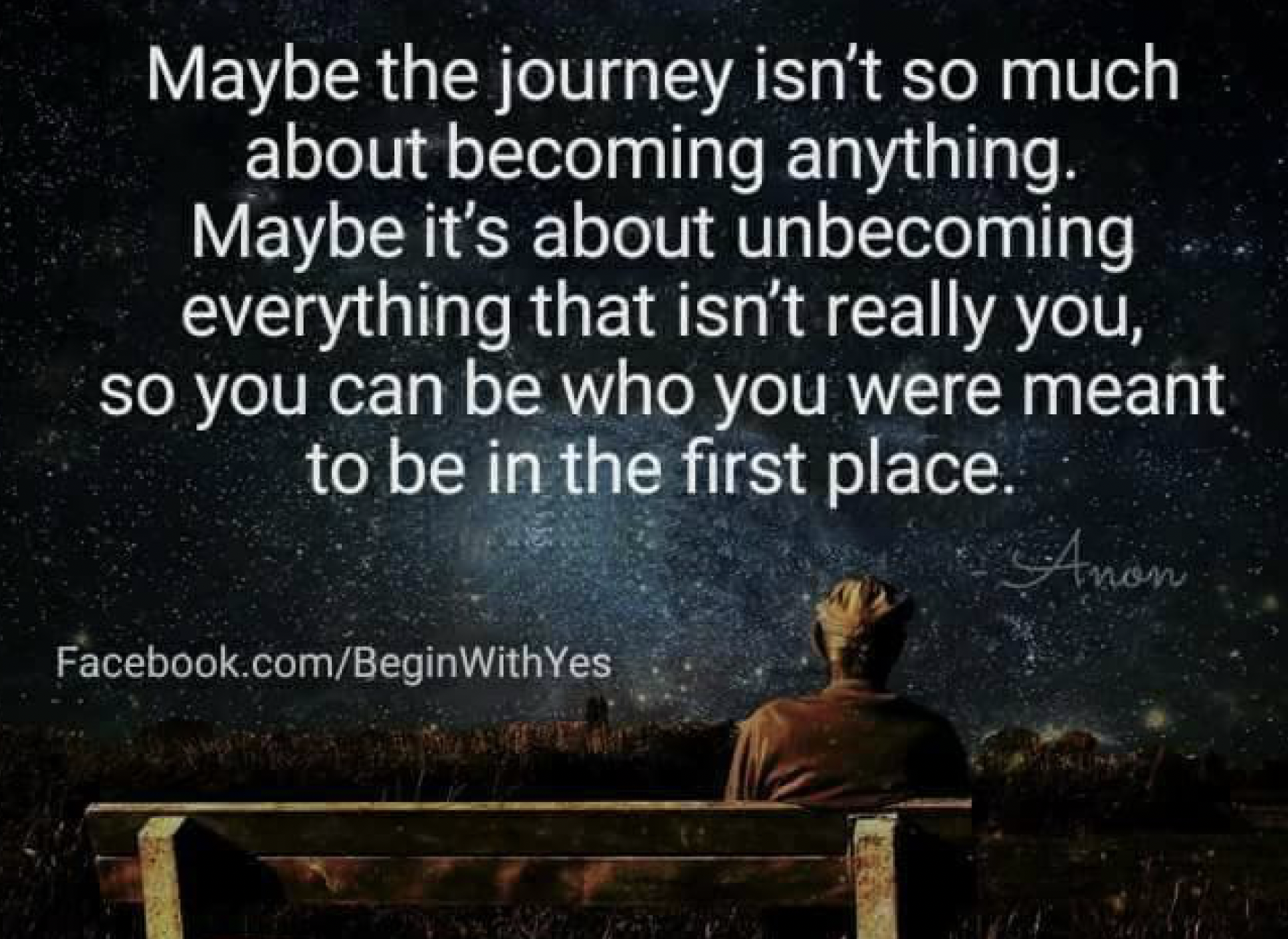
No disrespect to some locations, but we have been places where it’s original claims didn’t quite match up. For some today, the reason to leave is forced upon them/ I’m thinking of the migrants from Syria, or those forced to leave Lesbos this week. We are possibly experiencing a ‘dislocation’ due to CV19. What we seek is to return to normality again. So some of them wanted to return to flourish. What does flourishing mean to you?
Have you ever been somewhere and then thought you’d like to return home?
Context: The Exile
The exile to Egypt and Babylon (Iran/Iraq) had not been a great success in reality. The people had left the promised land and were now seeking to return there. Yes, many had made a good living, working with – more probably for – the locals. We started to look at this last week.
Nehemiah starts the process to return
(This is a paraphrase of New 3:1-32)
Nehemiah has gone to look at the devastation, and some have come to mock at the initial rebuilding. Then many different groups of people started to build their parts of the wall including various gates.
The priests of the day built the Sheep Gate; the folk from Jericho built right next to them, shoulder to shoulder. The family of Hassenaah built the Fish Gate with other families, with the folk from Tekoa, some 10 miles south of Jerusalem, doing running repairs as needed.
The families from Gibeon and Mizpah helped others repair the Old Gate. All around the walls of Jerusalem, families gathered building places known as: the Broad Wall; the Valley Gate; the Dung Gate (phew); the Fountain Gate; the Water Gate (no connection to US politics); and the Horse Gate. Swathes of wall were rebuilt by families working as one. Some supported financially, others of all trades worked physically to restore the walls. The gates were consecrated as the whole project was holy. What does flourishing mean to them?
What can we explore from this?
Nehemiah, the cup bearer to the king, had spent much time in mourning, weeping and praying. He wanted God to restore the people and allow him to help with the rebuilding of the walls of Jerusalem.
Nehemiah then inspects the walls, speaks to the nobles, officials and the people who agree to help with that rebuilding. It doesn’t say whether they drew up plans, but it does appear that they were passionate about the job in hand.
Now you might be a person who follows those graphs on the news which predict the spread of the virus. I expect like Nehemiah in this story we go through a whole range of emotions in a day. from fear of not being able to overcome obstacles to disbelief and excitement when we see God at work.
Where is God in all of this?
Today for us may not be that dramatic but it may have those elements of fear and delight, doubt and hope as well. Now I’m hoping that you can see out of a window and please feel free to go and look out if you can’t.
We’re all looking out of different shaped windows, each giving a variety of perspectives on the world. There may be buildings, trees or hills that obscure our view of the way ahead. There may be empty shops, birdsong or noise that is drawing our attention. What does flourishing mean to you?
Just like we see different perspectives on the world, we today may see God in a different way to the one that Nehemiah did. He may have seen a God of judgement and punishment, whereas today we may see a God of love, of forgiveness and one who wants to spend time with us, listen and speak to us whoever we are.
Nehemiah maybe longed to be outside and to be free of the authorities, to do what he believed God was asking of him.
Nehemiah saw God through the people in action as they built walls and doors alongside each other.
Recently whilst out on a walk recently we saw some little doors built on trees in Cadoc Wood. They could be seen as doors in our lives and opportunities to reach out to other people.
What doors might signify
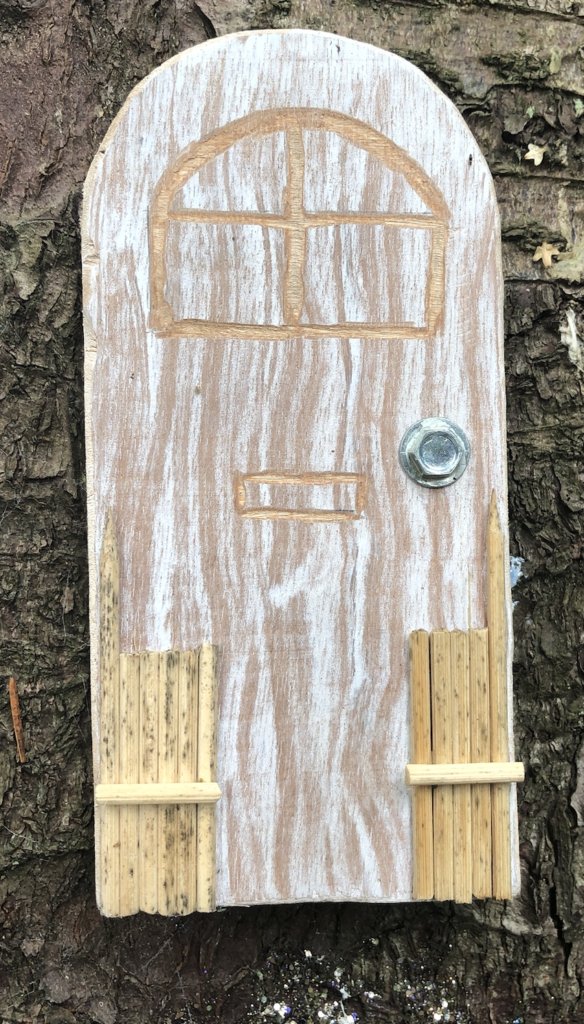
The first door we see is an “average” wooden door with a letterbox. Through which we can receive messages of all sorts, and glass panels whereby we can see people walking by.
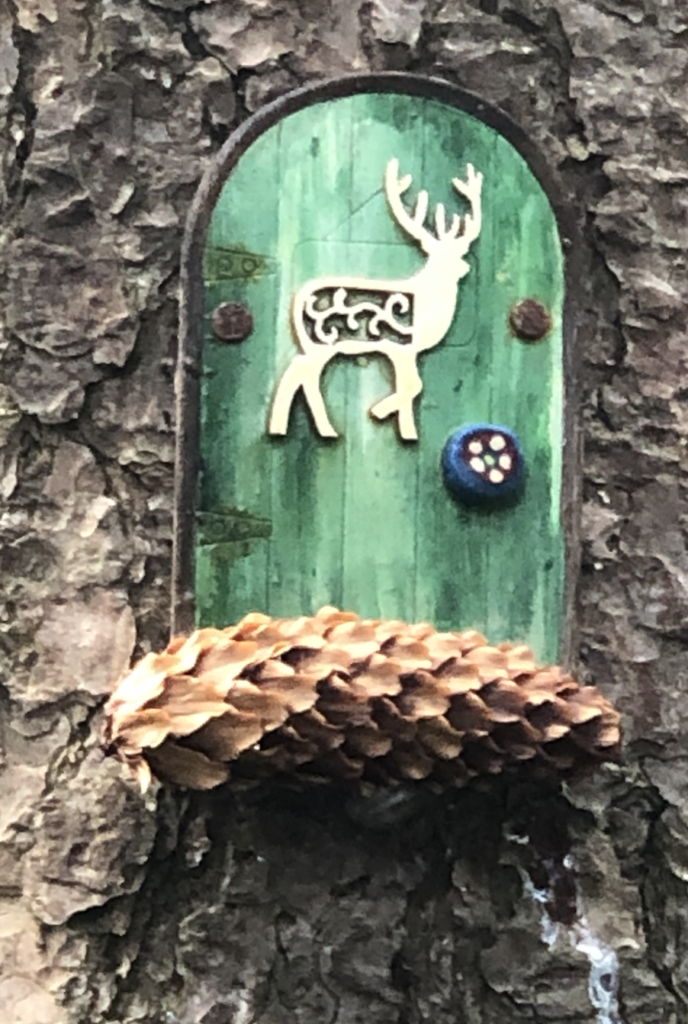
The second was a rustic green door with a wooden emblem of a stag and a pine cone on it. Now I don’t know who created this door but I imagine it may be showing God through nature.
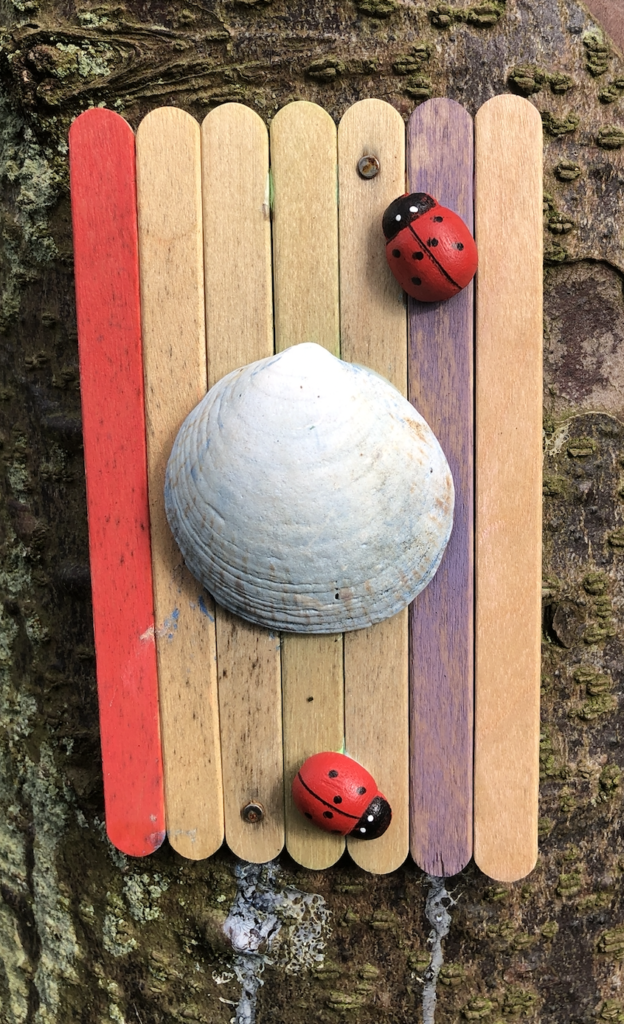
The third of these doors reminds me of a wooden garden gate near to the seafront. I could almost hear the sea lapping up the beach, flowing over the pebbles showing a God in creation.
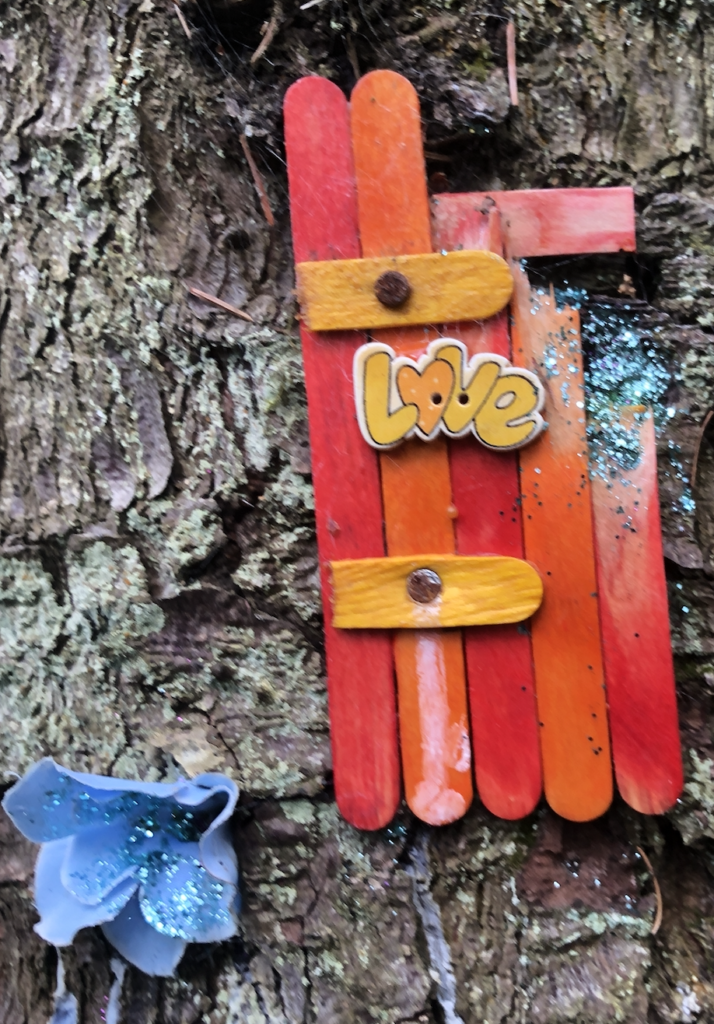
The final door is a broken red gate with a wilting blue flower at its base. There, emblazoned is the word love. This may depict that even in our vulnerable broken state, at times we can still see and be surrounded by God’s love.
Doors that Protect or Release?
These are rather different gates or doors than those that have been described in Nehemiah. Nevertheless they can open up possibilities, opportunities to reach out in love. Some protect as did the walls, but others seem to break out, seeking to grasp the beauty of the natural world, and of love itself.
We see Jesus through each other as we are like his hands and feet, his messengers, his carriers of love. This Coronavirus is carried in a way that we cannot see but we see the effect that it has on people across our world. Let us carry Jesus’ message by the love that we show other people.
Every time we keep 2m away from someone we show love. Every phone call where we encourage someone we show love. Each letter we write that brings hope to its reader shows love. As we sit looking out of our windows this morning or later take a walk, catch a bus or drive our cars there are windows of opportunity for prayer. For those we see and know and those we don’t know in our communities across this circuit.
Where does Church come into this?
There were some gates or doors earlier. One of which was that red one, with love written on the door. It was made of lollypop sticks and in the fullness of time, some of the upper parts of the sticks have broken off. They have splintered and the top of the door is ragged – some might even say broken.
However, many of us may have felt more inclined, that that door resonated with our innermost feeling when we saw it initially. I wonder whether that was because it demonstrated exactly how we might wish to be: loved but also vulnerable. That vulnerability evident by the broken nature of the upper part of the door.
Paul’s message to the Corinthians
In the accompanying passage to Nehemiah (1 Cor 12:12-20), Paul is describing the body of Christ as a metaphor. Contrary to the Roman views at the time, he claims that the weaker parts are more indispensable. Paul is claiming that all are valued, every single one of us. Given the heavily enforced hierarchy of the day, this must have come across as very odd, scandalous in fact. Such is God’s love that all are loved – “Jews or Greeks, “slaves or free” – we are all of ‘one Spirit’. What headlines this would have created back then.
We too long to be outside, to return to our worship with friends on a regular basis and to be free from gov advice to stay home at times of local lockdown. Whether we’re sitting in our locked homes, sitting outside by our front doors or watching our tv screens. Through every situation we’re in, through other people and through prayer we can see God in action in our lives. What does flourishing mean here?
The walls are rebuilt
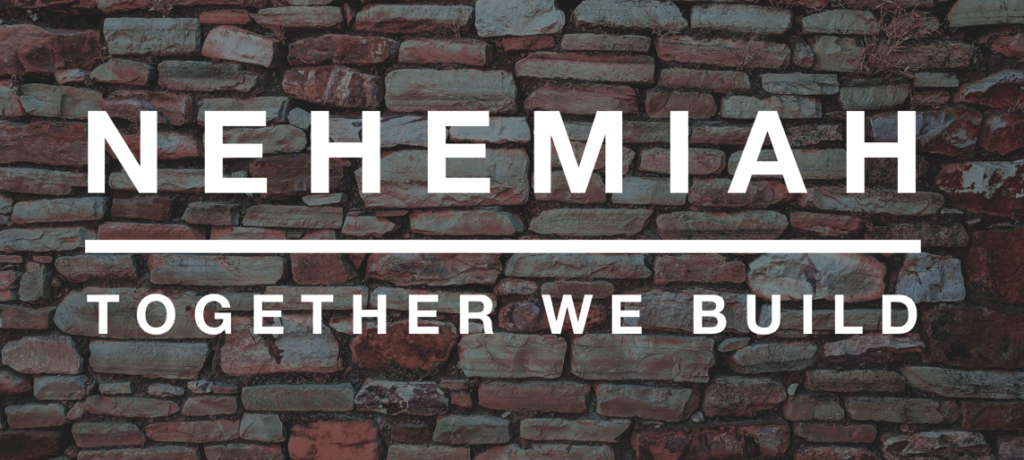
But it doesn’t seem to be new, for Nehemiah was seeing the rebuilding of the walls of Jerusalem by all people. Whether they were skilled in wall building or not, all worked hard to rebuild the city. I love the idea of those skilled in making and setting down bricks possibly training others how to build as well. For there was a purpose, to rebuild the walls.
And so many different families, coming from near and far, all working alongside each other, for the common good. There wasn’t hierarchy evident – good to see the ministers getting stuck in as well, it was a level playing field.
Church today?
As we consider our Church today, whether it be a building, or a body of people, are we really all in the same position. We are now coming together to see what can be done, to find where God is moving and looking to join in. Just as the Circuit and District have done with online services, they have sought to bring as many as possible together. Now we are looking to include everyone, whatever their skillset. Everyone will have a different gate to build: for context is everything. What does flourishing mean here?
We may well look at our own congregations. How those who have been separated by this pandemic from fellowship can be more closely integrated. We may have to prayerfully consider what is our community seeking, where is God already acting. Where might we see God’s church making an impact in people’s lives, where God’s love is truly felt. Both of these readings speak clearly that we are to work together, helping one another, growing in one spirit.
Are we, today, building up the walls, or looking to go through them?
But I also hear a call that the family, the body, isn’t merely as we saw it before the pandemic. Many may well be seeking to understand more about our faith, why do we believe what we do, what makes us believe and what impact it has upon our lives today. That body which Paul speaks about is larger than we might initially envisage. May we use the windows of opportunity which we’ve spoken about, to see where God is asking us to be.
May we prayerfully ponder on where God is asking us, our individual churches and as a Circuit to act – and then act. The people in Nehemiah’s time didn’t discuss and then think about it, but they strove for God’s kingdom. Here is our call, to be as one, to serve our God in the days weeks and months ahead. Is this what flourishing might mean?
What might we takeaway from this today?

Next time we receive an envelope or find a box in our homes why not pray asking God who we can contact with an email, letter or small gift.
It may mean running an errand, digging a flower bed, or listening on the phone and praying for someone. To us they are simple ideas but to those of us who are isolated this contact brings love, hope and God’s presence. This gives an opportunity to build relationships just as Nehemiah did when they built those walls all those years ago. Technology may have changed but people still yearn for a connection to nature, to the outside world, to people. Ultimately a connection to God’s love in order that we have hope, fulfilment and a life to come.
We are all on this journey – to and from different places. Let’s encourage each other, work together.
The service on YouTube
One thought on “The Community Returning to Flourish (Part 2)”
Comments are closed.